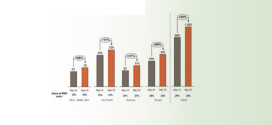 A largely pessimistic outlook for the demand for trade finance products in 2012 has been revealed by new research from the International Chamber of Commerce (ICC) and the International Monetary Fund (IMF).
A largely pessimistic outlook for the demand for trade finance products in 2012 has been revealed by new research from the International Chamber of Commerce (ICC) and the International Monetary Fund (IMF).
Based on inputs received from 337 financial institutions responding to a joint ICC-IMF survey, the findings also show a two-speed financial system: for emerging Asia the outlook is the strongest, while the euro area is the weakest.
“Around 60 per cent of respondents indicated that demand for trade in Asia will show improvement in 2012, while nearly half predicted a further deterioration for the euro area,” said Thierry Senechal, ICC senior policy manager for banking.
“Recent developments in European financial markets and their impact on global trade finance called for a market snapshot survey,” said Ranil Salgado, division chief, trade, institutions, and policy review, IMF. “Joining force with ICC has produced first-rate market research to help both the industry and policymaking communities to monitor emanating risks and provide timely input into on-going regulatory and G20 discussions.”
Factors contributing to the negative outlook for 2012 were primarily financial constraints reducing the availability of trade finance. This was particularly acute for large banks and those with business in developing countries. Some 90 per cent of respondents indicated that “less credit or liquidity available at counterparty banks” would affect their trade finance activities either to a “large extent” or to “some extent”. This is substantially higher than the just over 50 per cent that noted the same during the 2008-2009 financial crisis.
The financial constraints appeared to reflect the large share of trade finance coming from euro-area banks. The survey showed that recent European bank deleveraging has led to tighter lending guidelines and reduced availability of credit/liquidity. In addition, US-dollar funding for non-US financial institutions may exacerbate the situation because trade remained largely denominated in US dollars.
Many respondents noted that one of the challenges facing the global economy was a more stringent regulatory environment – as represented by the new Basel capital framework – that may impede a trade-led recovery. This was of particular concern, as many countries were attempting to export their way out of their currently dire economic conditions.
Basel III adds pressure
Recent measures taken by multilateral development banks (MDBs) and central banks to facilitate trade were perceived to be of some help. For instance, on the issue of the reactivation of central bank swap lines, close to 60 per cent of respondents indicated that the swap lines have helped, but about one fifth were not sure.
Preparation for the implementation of Basel III seems to be already adding pressure on the cost of funds and the availability of liquidity. Close to three-quarters of respondents said they felt impacted either to some or to a large extent. Specifically, by not treating trade finance as a low-risk asset class from a regulatory perspective, the new Basel capital framework could make trade finance less accessible and less affordable to exporters and importers, especially small- and medium-sized enterprises, the survey found.
In these circumstances, there is an urgent need for durable solutions to be forged at an international level. “The pursuit of essential public finance and regulatory reforms is crucial in 2012 and beyond,” said Kah Chye Tan, chairman of the ICC Banking Commission.
He added, “We caution the use of uncoordinated national initiatives and the layering of regulatory requirements that may pressure trade flows and eventually negatively impact on growth worldwide. This new ICC-IMF research calls on standard setters and policymakers to study carefully the potential, unforeseen impact of proposed Basel III changes on trade finance.”
More than ever, increasingly interconnected and interdependent financial markets are fraught with far-reaching uncertainties. The financial crisis of 2008-2009 and the recent downturn have shown that events that used to be localised or isolated now have systemic global, often unintended, consequences for all. Without doubt, the current global economic scene is forcing the business and policymaker communities to reconsider how to interact with each other to address challenges.
 Cash And Trade Magazine For Cash and Trade professionals in the Middle East
Cash And Trade Magazine For Cash and Trade professionals in the Middle East




